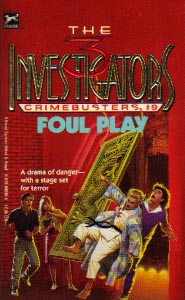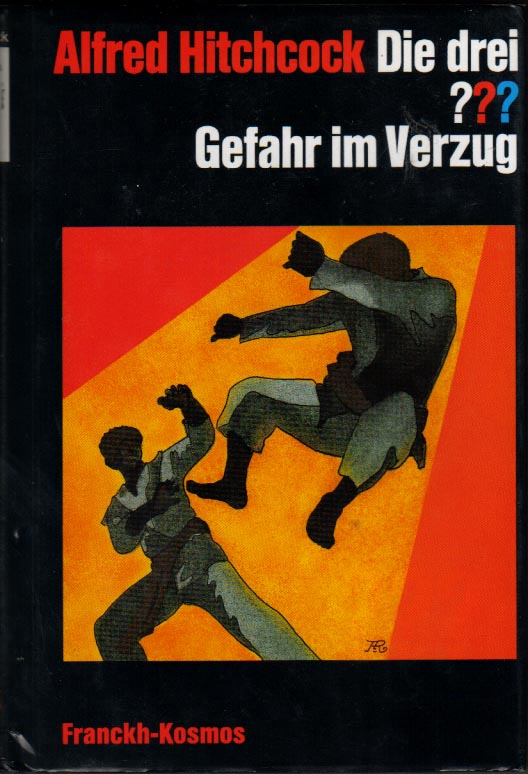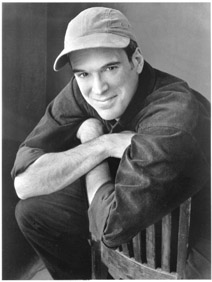PETER LERANGIS:
An Interview with a
3 Investigators
Crimebusters Author
by Mark Zahn
copyright 2002
U.S. paperback, 1990.
German hardbound with DJ, 1992.
After graduating Harvard with a degree in biochemistry, and following an eight-year career as an actor in musical theater, Peter Lerangis took another left turn into writing and has been following that path ever since. He cut his authorial teeth on Hardy Boys novels before graduating to The Three Investigators. After the demise of the series, he was forced to go undercover as the secret boy ghostwriter for The Baby-Sitters Club series (approximately 40 titles!), during which time (and after) he also wrote two best-selling teen thrillers (THE YEARBOOK and DRIVER'S DEAD), four hilarious middle-grade novels (SPRING FEVER!, SPRING BREAK, IT CAME FROM THE CAFETERIA, and ATTACK OF THE KILLER POTATOES), the award-winning six-book sci-fi/mystery series WATCHERS, and the two-book survival epic, ANTARCTICA. His movie novelizations include THE SIXTH SENSE and SLEEPY HOLLOW, as well as many Disney movie tie-ins under the name A.L. Singer (an anagram of "Lerangis"). His humorous mystery series for younger readers, ABRACADABRA, debuts in 2002, and he is at work on a hardcover historical novel entitled SMILER'S BONES.
MZ (Mark Zahn): How did you become involved with The Three Investigators "Crimebusters" series?
PL (Peter Lerangis): At the time, I had been writing Hardy Boys books, and Hardy Boys/Nancy Drew Super Mysteries. One of my editors was Bill McCay, who had also become a good friend. He had already been contacted by Jenny Fanelli at Random House/Knopf to write a Three Investigators novel. One day he asked if I was interested, too. I said, "Three who?" and that's how it all started.
MZ: You wrote "Foul Play" around 1990 - how long had writing been your full-time profession at that point?
PL: About three years.
MZ: Were you a fan of the older Three Investigators books, and if so, which one was your favorite?
PL: I had never read one of them! But, of course, I immersed myself in them before I started writing. I got a great kick out of "Rogues' Reunion."
MZ: I've read that Jack London inspired you at a very young age. What other books had an influence on you as a child?
PL: I thought Dr. Seuss was a genius. I memorized every one of his books. I read 1984 at an impressionable age. It scared me, but I adored it. I devoured every "Tom Swift" book I could get my hands on, and I read "The Forgotten Door," by Alexander Key, over and over.
MZ: After "Foul Play" you were commissioned to write another entry in the "Crimebusters" series: "Brain Wash." Were you surprised that the series was canceled so abruptly, especially after you had completed the manuscript for "Brain Wash" - which was never published?
PL: "Brain Dead" described my state of mind after hearing it would be canceled. It had a really interesting plot about a religious cult. Years later, Random House had a request (from England, I believe) to publish "Brain Wash," but the manuscript was too long. I revised it, but again, the title was dropped before anyone read it.
MZ: Did Random House provide you with a "Crimebusters Bible" that detailed how each character was to be portrayed in the new series?
PL: Yes, a very exacting one.
MZ: The format of the "Crimebusters" books are very consistent. Were you required to write a certain number of pages? Were the boys required to be put in certain situations in each book, ie: car chase, karate fight, etc.?
PL: You bet.
MZ: Did you do a lot of research for "Foul Play?"
PL: Yes, for the karate moves and lingo. The stagecraft I already knew, because I was a professional actor.
MZ: Was there anything about writing "Foul Play" that frustrated you? Any amusing anecdotes you can share?
PL: I was AWFUL at thinking up good chapter titles. My beleaguered editor would keep sending them back -- "No, this doesn't quite work ... try again ..." Anyway, the name for Chapter 14 --"Phantom of the Operating System" -- was my pride and joy. A great play on words, and appropriate to the action in the chapter. "Phantom of the Opera" was a new smash hit on Broadway, and the DOS operating system was proliferating on computers (this was 1989, after all). Well, my editor didn't quite understand it. I was heartbroken about this, until she called back and said she had shown the title to her computer-savvy husband. "He thought it was hilarious," she said. So, the title stayed --hoorah!
MZ: Other "Crimebusters" authors have stated that they received a royalty percentage from the sales of these books as opposed to a flat fee. Was this the case with you?
PL: Yes.
MZ: Would you have been interested in continuing with the series - writing a third "Crimebusters" book - had the series not been canceled?
PL: I think so. I liked those three guys - and I adored working with my editor.
MZ: What does the future hold for juvenile series literature?
PL: If I knew, the publishing companies would ambush me. Generally, what's popular in the adult mass market tends to filter to the juvenile market -- but what the heck this means, no one quite knows, and everyone is scrambling to guess.
MZ: Your "Watchers" books have built quite a following of fans - will there be more entries in the series?
PL: None are planned past Book 6. But a film/TV producer recently bought an option for a TV show -- so if that ever happens, perhaps the series will continue.
MZ: What books have you read recently?
PL: "Death Comes as the End," by Agatha Christie. "Give Me My Father's Body," by Kenn Harper. "Ex Libris," by Anne Fadiman. "Winn-Dixie," by Kate DiCamillo. "Moby Dick," by Herman Melville.
MZ: What does the future hold for Pete Lerangis?
PL: Vacations -- lots of vacations! Ah, well, I can wish. I have a new series of mysteries for young readers (meaning 2nd - 3rd graders), called ABRACADABRA. It's about a club of magician-detectives. And by "magic" I mean magic tricks, not fantasy magic. After that, a hardcover book for teens tentatively called "Smiler's Bones" about a Polar Eskimo boy orphaned in New York at the turn of the 20th century.
I would like to thank Mr. Lerangis for taking the time to share his story with us. Three Investigators fans are always hungry for information about their favorite series, and Peter has graciously provided a unique perspective on his brief stint in Rocky Beach, CA. On behalf of Three Investigators fans the world over, THANK YOU!
-- Mark Zahn
Peter Lerangis, author of Crimebusters #9 "Foul Play"
To learn more about him, visit the web site of Peter Lerangis.
Return to The Three Investigators Authors/Artists page.


